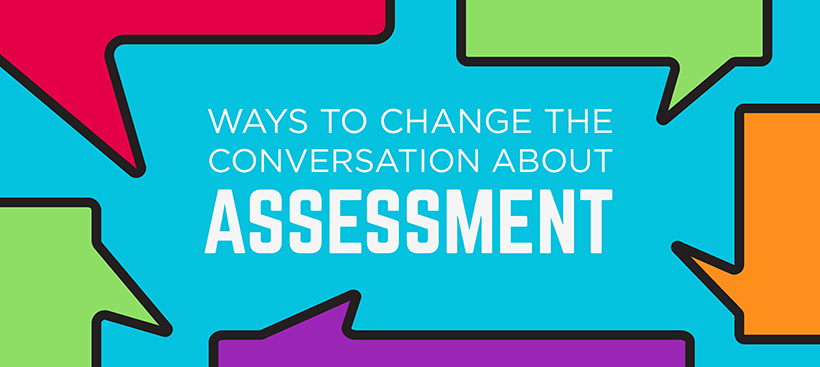From the NCTE Standing Committee on Literacy Assessment
Next week in Baltimore, we are excited to hear from you about what you’re doing in your classrooms to shift the way we talk about assessment. We’ll also share what we are doing in our classrooms at the two committee-sponsored sessions. We want to include more voices in these conversations, so each session is designed to promote plenty of discussion among participants.
Our first session on Friday features a panel of teachers sharing classroom assessment challenges and how NCTE resources can help us as classroom teachers respond in ways that promote learning.
E.24. Friday, 9:30–10:45 a.m.
Responding to Assessment Challenges in the Classroom
Convention Center Room 322
Authentic Assessment of Reading and Writing in the Classroom
Melissa McMullan (Elementary/Middle) Comsewogue School District, Wading River, NY,/Hofstra University
Knowing who our students are as readers and writers is the cornerstone of our practice. How can we craft classroom experiences in meaningful ways that help us get to know what our students can do, and what they need from us? In a climate dominated by standardized assessments that base a student’s reading and writing abilities on a given day, about a given topic, in what ways can we widen the lens to see our students for who they really are, and what they really need?
Formative Assessment for Small Group Instruction
Livia Fagundes (Elementary) P.S. 86, Jamaica, Queens, New York
This talk addresses how teachers can use formative assessments to plan and drive small group instruction. Formative assessments can take the form of “quick,” in-the-moment assessments that can be efficiently used to develop small group instruction in reading and writing. This talk will explore the range of formative assessments used in one linguistically diverse fourth grade classroom.
Professional Writing Partnerships as Formative Assessment
Eric Turley (Secondary) Kirkwood High School, Kirkwood, Missouri
This panelist explores how to build and maintain partnerships that incorporate “real-world” perspectives on writing assessment into our classrooms. The speaker demonstrates how partnering students with local nonprofit agencies provides an authentic space for formative assessment whereby students dialogue with and reflect on the perspectives of their mentors and self-assess their writing toward publication.
On Saturday, we’re sponsoring a roundtable session,led by experienced teachers and researchers. This is a great opportunity to join colleagues in discussing the ways we, as classroom teachers, can help shift the conversations about assessment away from testing and toward teaching and learning.
K.46 Saturday, 11:00 a.m.–12:15 p.m.
Teachers as Assessment Leaders in Literacy: Roundtable Discussions on Current Trends in Assessment
Convention Center Room 349
Engaging Diverse Families and Communities to Affect Change in Assessment Practices
Melissa McMullan (Elementary/Middle) Comsewogue School District, Wading River, NY,/Hofstra University
As teachers we know how to assess our students’ reading and writing. However, with increasing frequency we are being asked to administer assessments to our students that provide limited, if not erroneous, information about who they are as readers and writers. In what ways can we engage with families and communities where we work to shift the paradigm from one-size-fits-no-one assessments to authentic evaluative practices that guide instruction and support readers and writers?
Do it for the Culture: Using Culturally Relevant Assessments in the Classroom
Valente’ Gibson (Elementary/Middle) Jackson Creek Elementary, Columbia, SC
This interactive conversation is prepared to communicate meaningful culturally relevant assessments in the elementary and middle level classroom that allow students to become empowered by their voice and various backgrounds while striving for academic success. This roundtable explores the use of families and students as a resource while inviting other teachers to share their practices to connect to culturally relevant ways.
New Directions in Electronic Portfolios
Kathleen Blake Yancey (College) Florida State University
In community colleges, colleges, and universities large and small, electronic portfolios are becoming part of students’ education. They serve very different purposes, among them to navigate and document general education, to reflect on learning, to find jobs, and/or to support integrative and experiential learning that occurs both inside and outside the classroom. We’ll review some popular models of ePortfolio and identify useful resources.
Assessment Consensus
Josh Flores, M.Ed. (Secondary)
Coming to consensus is fun and messy, especially when teams of teachers determine what skills need prioritizing for classroom assessments. Like all teachers, I wish we had enough time to teach every literacy standard students need to survive college and career. Alas, it’s our professional responsibility to prioritize our class time. During this roundtable, we’ll discuss how to do it.
Alternatives to Rubrics
Peggy O’Neill, Loyola University Maryland
Despite sound arguments against the use of rubrics in the classroom, teachers are often expected to create and use rubrics to assess students. But are rubrics the best way to get at what students know and understand? Do rubrics allow students to show what they are able to do? Do rubrics allow for student choice and voice in their learning? In this roundtable, we will discuss some of the arguments for and against using rubrics. We will also explore more holistic tools and strategies that will provide the information that teachers, students and families need to help students learn better and feel better about their learning trajectory.
Led by experienced teachers and researchers, these sessions aim to help us all rethink the role of assessment to improve teaching and learning and identify productive ways to respond to assessment mandates.
NCTE Standing Committee on Literacy Assessment
CHAIR, Peggy O’Neill (Loyola University, Baltimore, MD)
Josh Flores (Birmingham, AL)
Bobbie Kabuto (Queens College, Flushing, NY)
Becky McCraw (Goucher Elementary School, Gaffney, SC)
Kathryn Mitchell Pierce (Saint Louis University, MO)
Elisa Waingort (Calgary, Alberta, Canada)
Kathleen Blake Yancey (Florida State University, Tallahassee)

